古文英译:郑人买履
成语双语故事:郑人买履
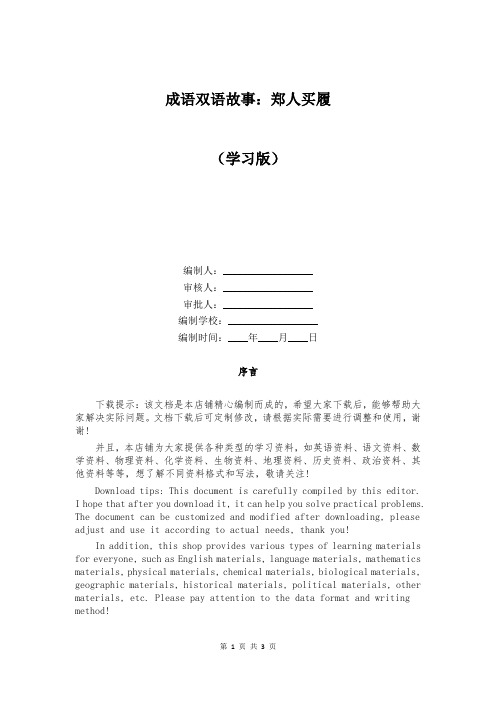
成语双语故事:郑人买履(学习版)编制人:__________________审核人:__________________审批人:__________________编制学校:__________________编制时间:____年____月____日序言下载提示:该文档是本店铺精心编制而成的,希望大家下载后,能够帮助大家解决实际问题。
文档下载后可定制修改,请根据实际需要进行调整和使用,谢谢!并且,本店铺为大家提供各种类型的学习资料,如英语资料、语文资料、数学资料、物理资料、化学资料、生物资料、地理资料、历史资料、政治资料、其他资料等等,想了解不同资料格式和写法,敬请关注!Download tips: This document is carefully compiled by this editor.I hope that after you download it, it can help you solve practical problems. The document can be customized and modified after downloading, please adjust and use it according to actual needs, thank you!In addition, this shop provides various types of learning materials for everyone, such as English materials, language materials, mathematics materials, physical materials, chemical materials, biological materials, geographic materials, historical materials, political materials, other materials, etc. Please pay attention to the data format and writing method!成语双语故事:郑人买履do sth by the book郑人买履A man of the state of Zheng wanted to buy a pair of shoes.从前,郑国有个人想买双鞋。
成语故事汉译英2
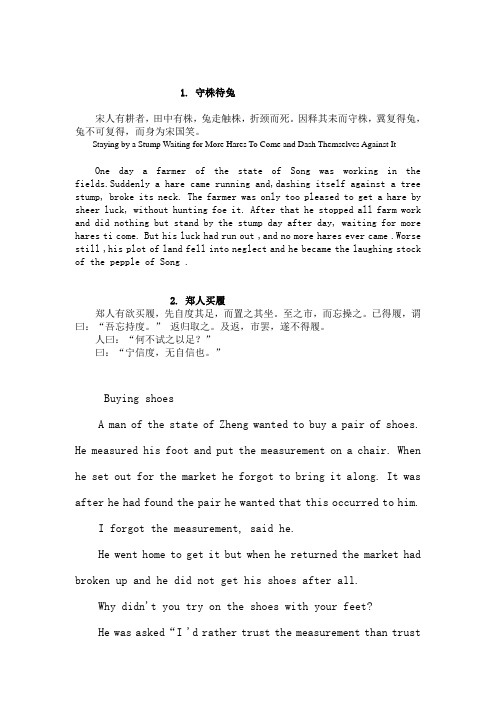
1. 守株待兔宋人有耕者,田中有株,兔走触株,折颈而死。
因释其耒而守株,冀复得兔,兔不可复得,而身为宋国笑。
Staying by a Stump Waiting for More Hares To Come and Dash Themselves Against ItOne day a farmer of the state of Song was working in the fields.Suddenly a hare came running and,dashing itself against a tree stump, broke its neck. The farmer was only too pleased to get a hare by sheer luck, without hunting foe it. After that he stopped all farm work and did nothing but stand by the stump day after day, waiting for more hares ti come. But his luck had run out ,and no more hares ever came .Worse still ,his plot of land fell into neglect and he became the laughing stock of the pepple of Song .2. 郑人买履郑人有欲买履,先自度其足,而置之其坐。
至之市,而忘操之。
已得履,谓曰:“吾忘持度。
” 返归取之。
及返,市罢,遂不得履。
人曰:“何不试之以足?”曰:“宁信度,无自信也。
”Buying shoesA man of the state of Zheng wanted to buy a pair of shoes. He measured his foot and put the measurement on a chair. When he set out for the market he forgot to bring it along. It was after he had found the pair he wanted that this occurred to him.I forgot the measurement, said he.He went home to get it but when he returned the market had broken up and he did not get his shoes after all.Why didn't you try on the shoes with your feet?He was asked“I 'd rather trust the measurement than trustmyself”也有一些恒星非常小,有的比地球还小。
郑人买履文言文及翻译

郑人买履文言文及翻译《郑人买履》这则故事故事中的人只相信量脚得到的尺码,而不相信自己的脚,不仅闹出了大笑话,连鞋子也买不到。
今天店铺要给大家介绍的便是郑人买履文言文及翻译,欢迎阅读!郑人买履文言文及翻译原文郑人有欲买履者,先自度其足,而置之其坐,至之市,而忘操之。
已得履,乃曰:“吾忘持度。
”反归取之。
及反,市罢,遂不得履。
人曰:“何不试之以足? ”曰:“宁信度,无自信也。
”译文有一个想要买鞋的郑国人,他先测量好自己脚的尺码,然后把尺码放在他的座位上。
等到了集市,他忘了带量好的尺码。
他已经挑好了鞋子,才说:“我忘记带量好的尺码了。
”返回家去取尺码。
等到他返回集市的时候,集市已经散了,于是他没有买到鞋。
有人问:“为什么不用你的脚去试试鞋的大小呢?” 他说:“我宁可相信量好的尺码,也不相信自己的脚。
”阅读题目18.解释文中加点的字。
(2分)1、___________________________2、____________________________3、____________________________4、____________________________19.翻译文中划线句子。
(4分)20.从文中找出郑人最可笑的言行。
(2分)____________________________21.从这篇寓言中你懂得了什么道理?(2分)____________________________22.这则寓言讽刺了什么样的人?(2分)阅读答案18.(2分)1、量长短 2、到……去 3、量好的尺码 4、同“返”,返回。
19.(4分)(1)为什么不用脚试一试鞋子的大小呢?(2)我宁可相信尺码,也不相信自己的脚。
20.(2分)宁信度,无自信也。
21.(2分)说明做事迷信教条而不顾客观实际,是不会成功的。
22、(2分)讽刺了因循守旧,固执己见,不知变通,不懂得根据客观实际,采取灵活对策的蠢人。
郑人买履文言文及翻译原文郑人有欲买履者,先自度(duó)其足,而置之其坐。
《郑人买履》文言文意思

《郑人买履》文言文意思《郑人买履》文言文意思郑人买履,既是一个成语,又是一个典故,更是一寓言,说的是郑国人因过于相信“尺度”,造成买不到鞋子的故事。
它告诉人们,遇事要实事求是,要会灵活变通,不要死守教条。
原文:郑人有欲买履者,先自度(duó)其足,而置之其坐。
至之市而忘操之。
已得履,乃曰:“吾忘持度(dù)。
”反归取之。
及反,市罢,遂(suì)不得履。
人曰:“何不试之以足?”曰:“宁(nìng)信度,无自信也。
”注释1.郑:春秋时代一个小国的名称,在现今河南省的新郑县。
2.欲:将要,想要。
3.者:......的人。
(定语后置)4.先:首先。
5.度(duó):测量。
6.而:连词,表示承接。
7.置:放置,搁在。
8.之:代词,代它,此处指量好的尺码。
9.其:他的。
10.坐:通假字,同“座”,座位。
11.至:等到,直到。
12.之:到……去,往13.操:携带。
14.已:已经。
15.得:得到;拿到。
16.履:鞋。
17.乃:于是,这才。
18.持:拿。
19.度(dù):量好的尺码。
20.反:通假字,同“返”,返回。
21.市罢:集市散了。
23.遂:于是。
24.曰:说。
25.宁(nìng):宁可。
26.无:不。
27.自信:相信自己。
28.以:用。
注意字词【读音】履:lǚ 边音,第三声【读音】度:duó 多音字,第二声【读音】宁:nìng 鼻音,第四声【读音】遂:suì 非常用生字,第四声译文有一个想要买鞋的郑国人,他先量好自己脚的.尺码,然后把量好的尺码放在他的座位上。
等到了集市,他忘了带量好的尺码。
他已经挑好了鞋子,才说:“我忘记带量好的尺码了。
”于是返回家去取尺码。
等到他返回集市的时候,集市已经散了,他最终没有买到鞋。
有人问:“为什么不用你的脚去试试鞋的大小呢?” 他说:“我宁可相信量好的尺码,也不相信自己的脚。
郑人买履文言文译文鉴赏
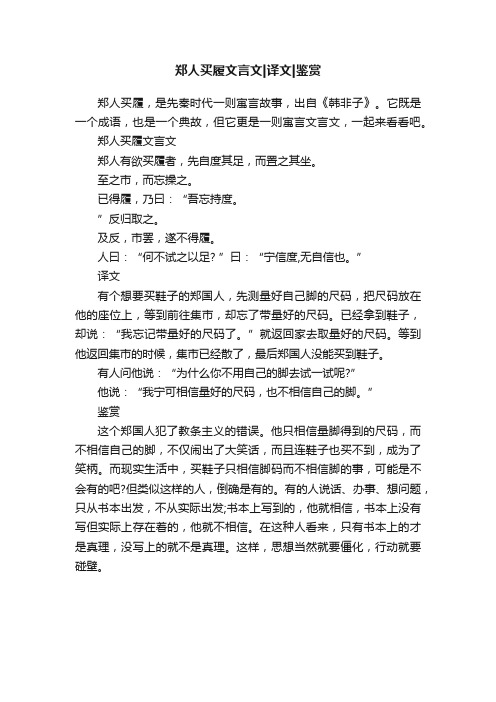
郑人买履文言文|译文|鉴赏
郑人买履,是先秦时代一则寓言故事,出自《韩非子》。
它既是一个成语,也是一个典故,但它更是一则寓言文言文,一起来看看吧。
郑人买履文言文
郑人有欲买履者,先自度其足,而置之其坐。
至之市,而忘操之。
已得履,乃曰:“吾忘持度。
”反归取之。
及反,市罢,遂不得履。
人曰:“何不试之以足? ”曰:“宁信度,无自信也。
”
译文
有个想要买鞋子的郑国人,先测量好自己脚的尺码,把尺码放在他的座位上,等到前往集市,却忘了带量好的尺码。
已经拿到鞋子,却说:“我忘记带量好的尺码了。
”就返回家去取量好的尺码。
等到他返回集市的时候,集市已经散了,最后郑国人没能买到鞋子。
有人问他说:“为什么你不用自己的脚去试一试呢?”
他说:“我宁可相信量好的尺码,也不相信自己的脚。
”
鉴赏
这个郑国人犯了教条主义的错误。
他只相信量脚得到的尺码,而不相信自己的脚,不仅闹出了大笑话,而且连鞋子也买不到,成为了笑柄。
而现实生活中,买鞋子只相信脚码而不相信脚的事,可能是不会有的吧?但类似这样的人,倒确是有的。
有的人说话、办事、想问题,只从书本出发,不从实际出发;书本上写到的,他就相信,书本上没有写但实际上存在着的,他就不相信。
在这种人看来,只有书本上的才是真理,没写上的就不是真理。
这样,思想当然就要僵化,行动就要碰壁。
郑人买履的意思
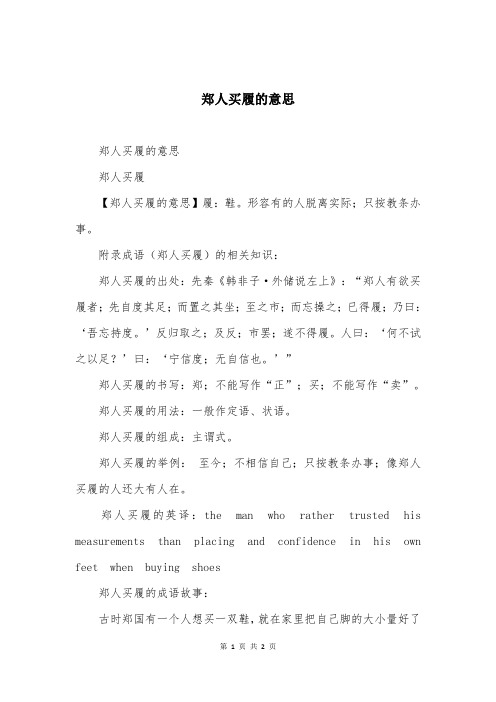
郑人买履的意思
郑人买履的意思
郑人买履
【郑人买履的意思】履:鞋。
形容有的人脱离实际;只按教条办事。
附录成语(郑人买履)的相关知识:
郑人买履的出处:先秦《韩非子·外储说左上》:“郑人有欲买履者;先自度其足;而置之其坐;至之市;而忘操之;已得履;乃曰:‘吾忘持度。
’反归取之;及反;市罢;遂不得履。
人曰:‘何不试之以足?’曰:‘宁信度;无自信也。
’”
郑人买履的书写:郑;不能写作“正”;买;不能写作“卖”。
郑人买履的用法:一般作定语、状语。
郑人买履的组成:主谓式。
郑人买履的举例:至今;不相信自己;只按教条办事;像郑人买履的人还大有人在。
郑人买履的英译:the man who rather trusted his measurements than placing and confidence in his own feet when buying shoes
郑人买履的成语故事:
古时郑国有一个人想买一双鞋,就在家里把自己脚的大小量好了
第 1 页共2 页
尺寸。
他来到了集市上卖鞋的店铺里,看好了一双鞋,正准备买的时候,忽然发现自己量好的尺寸放在家里忘了带来了,就说忘了带尺寸,回家拿来尺寸再买,所以就往回走,但集市已经关门。
旁边的人问他,你给自己买鞋,为什么不直接试试大小,非按原本的尺寸干啥?郑国的那人就说,我宁可相信我量的尺寸合适,脚却不一定准确。
第 2 页共2 页。
郑人买履英语故事

郑人买履英语故事这是一个关于郑人买履的英语故事,讲述了一个郑国人因为不量自己的脚而买了不合适的鞋子,最终通过智慧解决了问题。
下面是本店铺为大家精心编写的3篇《郑人买履英语故事》,供大家借鉴与参考,希望对大家有所帮助。
《郑人买履英语故事》篇1Once upon a time in ancient China, there was a man from Zheng who loved to buy new shoes. He would go to the market every week and browse through all the shoes on display, looking for the perfect pair.One day, the man decided to buy a pair of shoes that were very stylish but a bit expensive. He tried them on in the store and they fit perfectly. He was so happy with his purchase that he forgot to measure his feet before leaving the store.As he walked home, the man began to feel a pinching in his toes. He assumed that it was just because the shoes were new and that they would stretch with time. But as he continued to walk, the pain became more intense.When he finally arrived home, he took off his shoes and discovered that his feet were red and swollen. He was shocked to realize that the shoes were too small and had rubbed his feet raw.The man was disappointed and frustrated, but he didn"t want to waste the money he had spent on the shoes. He decided to use his ingenuity to solve the problem.He took a piece of paper and measured his footprint, then took the measurements to a cobbler. The cobbler used the measurements to make a pair of shoes that fit the man"s feet perfectly.The man was happy with his new shoes and wore them proudly every day. He learned from this experience to always measure his feet before buying shoes, no matter how stylish they might be.This story may seem simple, but it teaches a valuable lesson: always think before you act, and don"t be afraid to use your ingenuity to solve problems. Whether you"re buying shoes or facing a more complex challenge, it"s important to take the time to think things through and find a solution that works.《郑人买履英语故事》篇2The English story of "A Zheng Person Buying Shoes" goes as follows:There was a man from Zheng who needed to buy a new pair of shoes. He decided to measure his foot at home before going tothe market to ensure that he bought the right size. He used a piece of string to measure the length of his foot and then marked the measurement on the string.When he arrived at the market, he found a cobbler who had a pair of shoes that he thought would be perfect for him. However, he couldn"t remember the measurement of his foot, so he took out the string and measured his foot again. To his surprise, the measurement was different from the one he had marked on the string.Confused, the Zheng person asked the cobbler for advice. The cobbler said, "Why don"t you use your foot to measure the shoe? If it fits, it"s the right size." The Zheng person realized that he had been measuring his foot the wrong way all along. He thanked the cobbler for his advice and bought the shoes, which fit perfectly.This story is often used to illustrate the importance of thinking outside the box and not always relying on conventional methods to solve problems.《郑人买履英语故事》篇3The story of "Zheng Ren Bu Lv" is a well-known Chinese fable about a man from the state of Zheng who needed to buy a new pairof shoes. The man, who was very particular about fitting, decided to measure his foot at home before going to the market. However, he ended up forgetting the measurements and relied on the size of his old shoes to guide him.When the man arrived at the market, he found a cobbler who had a variety of shoes for sale. The man asked the cobbler if he had a pair of shoes that fit his foot size. The cobbler replied that he did not have any shoes in stock that would fit the man"s foot, but he could make a custom pair for him.The man was worried that the custom-made shoes would not fit properly, so he insisted on buying a pair of shoes that were already made. He found a pair of shoes that he thought would fit, but when he tried them on, he 发现他们太大了。
小古文—— 郑人买履
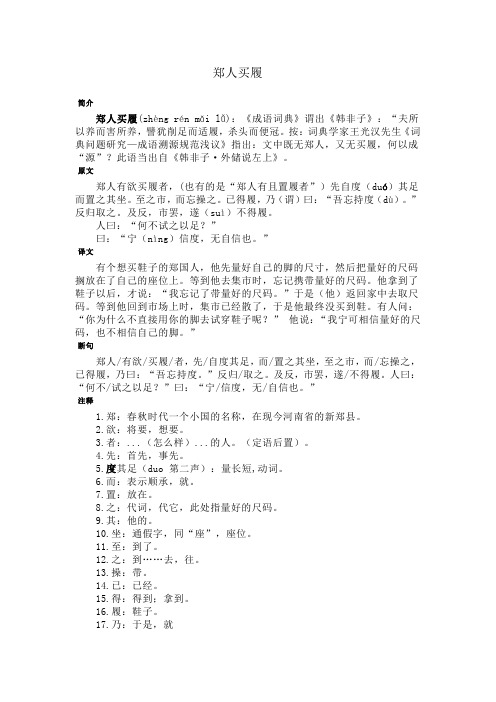
郑人买履简介郑人买履(zhèng rén mǎi lǚ):《成语词典》谓出《韩非子》:“夫所以养而害所养,譬犹削足而适履,杀头而便冠。
按:词典学家王光汉先生《词典问题研究—成语溯源规范浅议》指出:文中既无郑人,又无买履,何以成“源”?此语当出自《韩非子·外储说左上》。
原文郑人有欲买履者,(也有的是“郑人有且置履者”)先自度(duó)其足而置之其坐。
至之市,而忘操之。
已得履,乃(谓)曰:“吾忘持度(dù)。
”反归取之。
及反,市罢,遂(suì)不得履。
人曰:“何不试之以足?”曰:“宁(nìng)信度,无自信也。
”译文有个想买鞋子的郑国人,他先量好自己的脚的尺寸,然后把量好的尺码搁放在了自己的座位上。
等到他去集市时,忘记携带量好的尺码。
他拿到了鞋子以后,才说:“我忘记了带量好的尺码。
”于是(他)返回家中去取尺码。
等到他回到市场上时,集市已经散了,于是他最终没买到鞋。
有人问:“你为什么不直接用你的脚去试穿鞋子呢?” 他说:“我宁可相信量好的尺码,也不相信自己的脚。
”断句郑人/有欲/买履/者,先/自度其足,而/置之其坐,至之市,而/忘操之,已得履,乃曰:“吾忘持度。
”反归/取之。
及反,市罢,遂/不得履。
人曰:“何不/试之以足?”曰:“宁/信度,无/自信也。
”注释1.郑:春秋时代一个小国的名称,在现今河南省的新郑县。
2.欲:将要,想要。
3.者:...(怎么样)...的人。
(定语后置)。
4.先:首先,事先。
5.度其足(duo 第二声):量长短,动词。
6.而:表示顺承,就。
7.置:放在。
8.之:代词,代它,此处指量好的尺码。
9.其:他的。
10.坐:通假字,同“座”,座位。
11.至:到了。
12.之:到……去,往。
13.操:带。
14.已:已经。
15.得:得到;拿到。
16.履:鞋子。
17.乃:于是,就18.持:拿。
19.度(dù):量好的尺码。
郑人买履刻舟求剑幼时记趣三峡翻译

郑人买履郑人有欲买履者,先自度其足1,而置之其坐2。
至之3市,而忘操4之。
已得履, 1[度]量长短。
2[座]同座,座位。
3[之]到……去。
4[操] 拿,携带。
有个郑国人,想去买鞋子,事先量了自己的脚,把量好的尺寸放在自己的座位上。
到了前往集市的时候,却忘了带上它。
已经拿到鞋子,谓曰:“吾忘持度5!”反6归取之。
及7反,市罢,遂8不得履。
人曰:“何不试之以足?”曰:5[度]这里指量好的尺码6[反]同"返",返回7[及]到、等到。
8[遂]终于。
(才发现忘了带尺寸)就对卖鞋子的人说:“我忘了带尺寸。
”就返回家拿尺寸。
等到他又返回集市时,集市已经散了,终于没有买到鞋子。
有人问:“为什么不用脚试一试鞋的大小呢?”“宁9信度,无10自信也。
”9[宁]宁可。
10[无]不,不要。
他回答说:“我宁可相信尺码,也不相信自己的脚。
”刻舟求剑楚人有涉江者,其剑自舟中坠于水。
遽11契12其舟,曰:“是13吾剑之所从坠。
”11[遽] 立即,匆忙。
12[契]雕刻 13[是]这儿有个楚国人渡江,他的剑从船中掉到水里,急忙在船边上刻下记号,说:“这儿是我的剑掉下去的地方。
”舟止,从其所契者入水求之。
舟已行矣,而剑不行。
求剑若此,不亦惑乎!1414[不亦惑乎] 不是很糊涂吗?惑,迷惑船停了,从他刻记号的地方下水找剑。
船已经前进了,但是剑(落在江底)不会随船前进,像这样找剑,不是很糊涂吗?幼时记趣.余.忆童稚时,能张目对日,明察..秋毫。
我童年睁大眼睛眼力看清秋天鸟兽身上新长的细毛,比喻极细小的东西形容眼力可以看清极其细小的东西译文:我回忆童年小的时候,能睁大眼睛对着太阳,眼力可以看清极其细小的东西。
2.见藐.小译文:看见极细小的东西,一定仔细观察它的花纹。
3.故时..有物外之.趣。
所以常常,时常的译文:所以时常有观察物体本身以外的乐趣。
4.夏蚊成雷,私拟..作群鹤舞空。
我比译文:夏天蚊子的飞鸣声像雷一样,我私下里把它们比做群鹤在空中飞舞。
十个中国成语故事的典故英文版

十个中国成语故事的典故英文版中国成语故事有很有趣的典故,那你知道哪些成语故事的典故呢?用英语如何讲好成语故事的典故呢?下面是小编为大家整理的十个中国成语故事的典故英文版,欢迎大家阅读和采纳,希望大家喜欢!十个中国成语故事的典故英文版范文一郑人买履A man of the state of Zheng wanted to buy a pair of shoes. He measured his foot and put the measurement on a chair. When he set out for the market he forgot to bring it along. It was after he had found the pair he wanted that this occurred to him.I forgot the measurement, said he.He went home to get it but when he returned the market had broken up and he did not get his shoes after all.Why didn't you try on the shoes with your feet?He was asked.I 'd rather trust the measurement than trust myself.十个中国成语故事的典故英文版范文二东施效颦Xi Shi, a famous beauty, had a pain in her bosom(胸部) , so she had a frown on her face when she went out. An ugly girl who lived nearby saw her and thought she looked very beautiful. therefore when she went home, she also put her hands on her bosom and had a frown on her face.When a rich man in the neighbourhood saw her, he shut his doors tightly and did not go out. When a poor man saw her, he took his wife and children and gave her a wide berth(保持安全距离) .She only knew Xi Shi's frown looked beautiful but she did not know the reason for its beauty.十个中国成语故事的典故英文版范文三专心致志Yi Qiu was known as the most famous expert at chess throughout the land. Once he gave lessons on chess to two men. One of them was netpletely absorbed in his teaching, listening attentively to Yi Qiu while the other, who seemed to be listening, had his mind on something else. In fact, he was having a fancy that a swan was flying towards him and he had in his hands a bow and an arrow, ready to shoot. As a result, though he was having the same lesson together with the first man, yet he turned out a much inferior(差的,自卑的) pupil.If one does not give single-hearted devotion to it, no skills will be learned.十个中国成语故事的典故英文版范文四买椟还珠A man from the state of Chu wanted to sell a precious pearl in the state of Zheng. He made a casket(小箱,棺材) for the pearl out of the wood from a magnolia(木兰) tree, which he fumigated(熏制) with spices. He studded the casket with pearls and jade, ornamented it with red gems and decorated it with kingfisher(翠鸟) feathers. A man of the state of Zheng bought the casket and gave him back the pearl.Too luxuriant(丰富的,奢华的) decoration usually supersedes(取代) what really counts. This man from Chu certainly knew how to sell a casket but he was no good at selling his pearl. And the man of Zheng didn't know which is really valuable.十个中国成语故事的典故英文版范文五万事俱备只欠东风China has been divided into three kingdoms historically: Wei in the north, Shu in the southwest and Wu in the southeast.Once Cao Cao from Wei led a 200,000 strong army down to the south to wipe out the kingdoms of Wu and Shu. Therefore, Wu and Shu united to defend his attack. Cao ordered his men to link up the boats by iron chains to form a bridge for the Cao's passing from the north bank of Yangtze River to the south bank. The General Commander of the allied army was Zhou Yu. He analyzed the situation carefully. Then he got a good idea. He decided to attack the enemy with fire. So he began to prepare for the neting battle. Suddenly he thought of the direction of wind. He needed the east wind to blow strongly in order to acnetplish his scheme. However, the wind did not nete for days. Thus Zhou Yu was worried about it. At that time, he got a note from Zhuge Liang, the military adviser of the State of Shu, which reads: "To fight Cao CaoFire will help you winEverything is readyExcept the east wind"Quickly he turned to Zhuge Liang for help. Zhuge told him not to worry and there would be an east wind in a couple of days. Two days later, the east wind helped Zhou acnetplish his scheme. At last, the allied army won the war.Later, people use it to say "All is ready except what is crucial".十个中国成语故事的典故英文版范文六相敬如宾During the Spring and Autumn Period (770-476 BC), there was a high official in the State of Jin. He once saw a farmer working in the field and his wife bringing his lunch to him in a very respectful manner. He showed great interest in the matter. He took the farmer back to Jin with him, and said to the King of Jin, "Respect is a demonstration of virtue. If one is respectful, hemust be virtuous. We should educate our people with virtue." But the King asked, "His father is guilty, is it wise to do so?" He replied, "Guan Zhong had been enemy to the Duke Huan of Qi, but the duke appointed Guan Zhong prime minister and finally acnetplished his hegemony. Shun exiled Gun but promoted his son Yu. You just make use of his strong points." At last, Duke Wen took his advice and put the farmer in an important position.Later, this idiom means a couple treats each other with respect like guests.十个中国成语故事的典故英文版范文七入木三分Wang Xi-zhi is one of the most famous calligraphers(书法家) during the Eastern Jin Dynasty of China. When he was very young, he practiced his art every day and never stopped.Later he absorbed the strong points of all the other schools of calligraphy, and developed his own unique style of writing. Because of his achievements, he has been honored as one of China's sages of calligraphy. One time, Wang Xi-zhi sketched in wood for an engraver to cut. Then the engraver found the ink had penetrated one centimeter into the wood."Ru Mu San Fen" is got from this story, which means the calligraphy is penetrating.Now it is often used to describe expressing sharp ideas or profound views.十个中国成语故事的典故英文版范文八一技之长Gong sun Long , is a famous scholar lived in the State of Zhao during the Warring States Period (475-221BC). He had kept a circle skilled people around him. He often said, "A wise man should welnete anyone with a specialty."One day, a man dressed in tattered(破烂的) and dirty clothes came to see him and said to him:" I have a special skill. "Gong asked: "What is it?""I have a loud voice and I'm good at shouting."Then Gong turned to his followers and asked," Who is good at shouting?" But none of them answered "Yes ". So the scholar took the man in.Some days later, Gong and his followers went on a trip. They came to a wide river and found the ferryboat was on the other side of the river. All of them had no idea. Suddenly, Gong thought of the shouting expert and turned to him, "Can you have a try?" The man realized it was the chance to show his skill. He shouted to the ferryman as loud as he could, "Hey, ferryman, nete here, we want to cross the river." As his voice ended, the ferryman came to fetch them. Gong was very satisfied with the new follower.Later, people use it to describe anyone who has a special professional skill.十个中国成语故事的典故英文版范文九叶公好龙In the Spring and Autumn Period, there lived in Chu a person named Chu Zhuliang, who addressed himself as "Lord Ye".It's said that this Lord Ye was very fond of dragons. The walls had dragons painted on them. The beams, pillars, doors and the windows were all carved with them. As a result, his love for dragons was spread out. When the real dragon in heaven heard of this Lord Ye, he was deeply moved. He decided to visit Lord Ye to thank him.You might think Lord Ye was very happy to see a real dragon. But, actually, at very the sight of the creature, he was scared outof his wits and ran away as fast as he could.From then on, people knew that Lord Ye only loved pictures or carvings which look like dragons, not the real thing.十个中国成语故事的典故英文版范文十望梅止渴Among the outstanding figures of Chinese history, famous either for their intelligence or treachery(背叛,变节), Cao Cao is one of the foremost.One hot day, he marched out his troops under a burning sun in a mountainous area. Bewilderingly(令人困惑地) he lost the way. The journey was long and the sun was scorching. After their fruitless and tiresome march, all voiced their great dissatisfaction with the leadership of Cao Cao. They bitterly complained of their great thirst. The antagonism(对抗) of the soldiers was growing fast and they were on the verge of staging a mutiny(兵变). The subordinate officers were helpless to cope with the situation.Cao Cao, however, in the nick of time cleverly and treacherously gave orders to his troops to march to the nearby plum trees for a rest and announced that soldiers would be allowed to eat the juicy sour(酸的) fruit as much as they desired.At the thought of the sour fruit the soldiers' complaint of great thirst as well as the antagonistic feeling were quickly forgotten.Based on the story the later generation formed the proverb "to quench one's thirst by looking up at plums", to illustrate a case where one takes comfort in believing that they have already attained that which was expected or desired.。
文言文短篇20首(带译文)

刻舟求剑——《吕氏春秋·察今》楚人有涉江者,其剑自舟中坠于水,遽(jù)契(qì)其舟,曰:“是吾剑之所从坠。
”舟止,从其所契者入水求之。
舟已行矣,而剑不行,求剑若此,不亦惑乎?参考译文:楚国有个渡江的人,他的剑从船中掉到水里。
他急忙在船边上用刀在掉下剑的地方做了记号,说:“这是我的剑掉下去的地方。
”船到目的地后停了下来,这个楚国人从他刻记号的地方跳到水里寻找剑。
船已经行驶了,但是剑没有移动,像这样寻找剑,不是很糊涂吗?郑人买履——《韩非子外储说左上》郑人有欲买履(lǚ)者,先自度(duó)其足,而置之其坐。
至之市,而忘操之。
已得履,乃曰:吾忘持度(dù)。
反归取之。
及反,市罢,遂不得履。
人曰:何不试之以足?曰:宁信度,无自信也。
参考译文:有个想要买鞋子的郑国人,他先量自己的脚,并把量好的尺码放在了自己的座位上。
到了集市,却忘了带量好的尺码。
已经拿到鞋子,才想起自己忘了带尺码,于是就说:“我忘记带量好的尺码了。
”就返回家去取量好的尺码。
等到他返回集市的时候,集市已经散了,于是就没有买到鞋。
有人问他说:“你为什么不用你的脚试鞋呢?”他说:“宁可相信量好的尺码,也不相信自己的脚。
”滥竽充数——《韩非子·内储说上》齐宣王使人吹竽(yú),必三百人。
南郭处士请为王吹竽,宣王说之,廪(lǐn)食以数百人。
宣王死,湣(mǐn)王立,好一一之,处士逃。
参考译文:齐宣王让人吹竽,一定要三百人的合奏。
南郭处士请求给齐宣王吹竽,宣王对此感到很高兴,拿数百人的粮食供养他。
齐宣王去世后,齐湣王继承王位,他喜欢听一个一个的演奏,南郭处士听后便逃走了。
揠苗助长——《孟子·公孙丑上》宋人有闵(mǐn)其苗之不长而揠(yà)之者,芒芒然归,谓其人曰:“今日病矣!予助苗长矣!”其子趋而往视之,苗则槁矣。
天下之不助苗长者寡矣。
以为无益而舍之者,不耘苗者也;助之长者,揠苗者也,非徒无益,而又害之。
郑人买履文言文翻译

郑人买履文言文翻译(学习版)编制人:__________________审核人:__________________审批人:__________________编制学校:__________________编制时间:____年____月____日序言下载提示:该文档是本店铺精心编制而成的,希望大家下载后,能够帮助大家解决实际问题。
文档下载后可定制修改,请根据实际需要进行调整和使用,谢谢!并且,本店铺为大家提供各种类型的经典范文,如英语单词、英语语法、英语听力、英语知识点、语文知识点、文言文、数学公式、数学知识点、作文大全、其他资料等等,想了解不同范文格式和写法,敬请关注!Download tips: This document is carefully compiled by this editor.I hope that after you download it, it can help you solve practical problems. The document can be customized and modified after downloading, please adjust and use it according to actual needs, thank you!In addition, this shop provides various types of classic sample essays, such as English words, English grammar, English listening, English knowledge points, Chinese knowledge points, classical Chinese, mathematical formulas, mathematics knowledge points, composition books, other materials, etc. Learn about the different formats and writing styles of sample essays, so stay tuned!郑人买履文言文翻译郑人买履,是先秦时代一则寓言故事,出自《韩非子外储说左上》。
英语故事
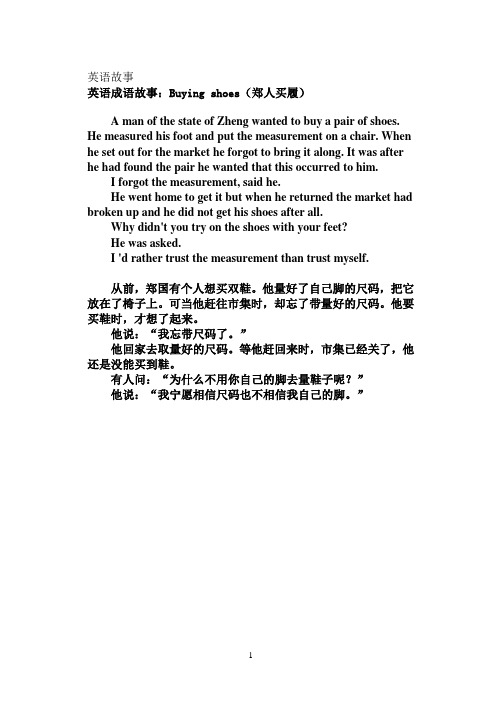
英语故事英语成语故事:Buying shoes(郑人买履)A man of the state of Zheng wanted to buy a pair of shoes. He measured his foot and put the measurement on a chair. When he set out for the market he forgot to bring it along. It was after he had found the pair he wanted that this occurred to him.I forgot the measurement, said he.He went home to get it but when he returned the market had broken up and he did not get his shoes after all.Why didn't you try on the shoes with your feet?He was asked.I 'd rather trust the measurement than trust myself.从前,郑国有个人想买双鞋。
他量好了自己脚的尺码,把它放在了椅子上。
可当他赶往市集时,却忘了带量好的尺码。
他要买鞋时,才想了起来。
他说:“我忘带尺码了。
”他回家去取量好的尺码。
等他赶回来时,市集已经关了,他还是没能买到鞋。
有人问:“为什么不用你自己的脚去量鞋子呢?”他说:“我宁愿相信尺码也不相信我自己的脚。
”英语小故事:A pleasant picnic河北省涞水县文教局教研室郭建春hot dog juice breaddogIt`s sunny today. My father, my mother, my sister an I go on a picnic in the park. It`s lunch time. Mother and father takeout,and. My mother likesvery much. My father loves. My sister and Ilove. Later, a comes up. It is hungry. Mysister gives it a . The enjoys it very much.We have a good time today.。
郑人买履译文
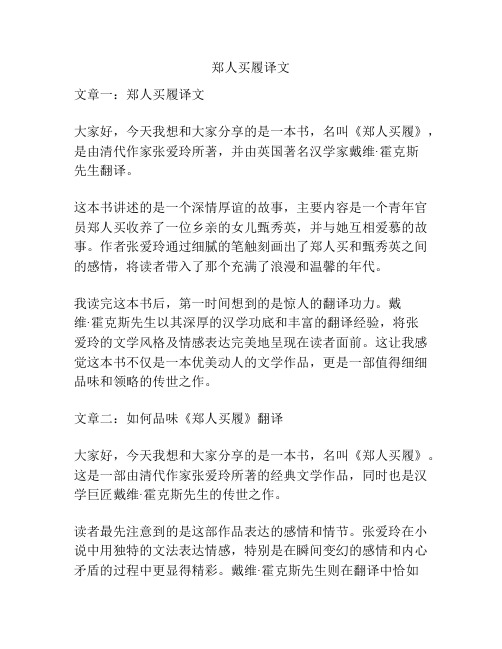
郑人买履译文文章一:郑人买履译文大家好,今天我想和大家分享的是一本书,名叫《郑人买履》,是由清代作家张爱玲所著,并由英国著名汉学家戴维·霍克斯先生翻译。
这本书讲述的是一个深情厚谊的故事,主要内容是一个青年官员郑人买收养了一位乡亲的女儿甄秀英,并与她互相爱慕的故事。
作者张爱玲通过细腻的笔触刻画出了郑人买和甄秀英之间的感情,将读者带入了那个充满了浪漫和温馨的年代。
我读完这本书后,第一时间想到的是惊人的翻译功力。
戴维·霍克斯先生以其深厚的汉学功底和丰富的翻译经验,将张爱玲的文学风格及情感表达完美地呈现在读者面前。
这让我感觉这本书不仅是一本优美动人的文学作品,更是一部值得细细品味和领略的传世之作。
文章二:如何品味《郑人买履》翻译大家好,今天我想和大家分享的是一本书,名叫《郑人买履》。
这是一部由清代作家张爱玲所著的经典文学作品,同时也是汉学巨匠戴维·霍克斯先生的传世之作。
读者最先注意到的是这部作品表达的感情和情节。
张爱玲在小说中用独特的文法表达情感,特别是在瞬间变幻的感情和内心矛盾的过程中更显得精彩。
戴维·霍克斯先生则在翻译中恰如其分地保留了原文的情感和文化遗产,尤其是在体现人物性格和交际方式上,完美地呈现了张爱玲鲜明的文学风格。
读者第二名称赏味的是这部作品的文化背景。
小说地点设定在两广及南洋,人物来自于南国胡越,在情节发展中展示了民间文化及传统文化,有很多流行的俗谚和诗句,这些也是戴维·霍克斯先生在翻译中需要细致描绘的。
总之,这是一本非常值得细细品味和体验的经典文学作品,读者在阅读过程中要注重细节,更要将其与文化背景相结合,从而更好地理解和品味小说中所描绘的情感和情节。
郑人买履文言文翻译及答案

郑人买履文言文翻译及答案郑人买履文言文翻译及答案篇一《郑人买履文言文翻译》郑人买履文言文翻译郑人买履文言文翻译及答案篇二《郑人买履古文翻译》郑人买履《韩非子》1.郑人有欲买履者,郑国有一个想要买鞋的人,2.先自度其足,而置之其坐。
先自己量了量他的脚,然后把尺寸放在他的座位上。
3.至之市,而忘操之,到了集市,却忘了拿尺寸,4.已得履,谓曰:“吾忘持度。
”已经拿到了鞋,对卖鞋的说:“我忘了带尺寸。
”5.反归取之。
返回去取尺寸。
6.及反,市罢,遂不得履。
等到他返回来,集市散了,于是他没有买到鞋。
7.人曰:“何不试之以足?”有人问他:“为什么不用你的脚去试试鞋呢?”8.曰:“宁信度,无自信也。
”他回答说:“宁可相信尺寸,也不相信自己的脚。
”郑人买履文言文翻译及答案篇三《《郑人买履》原文译文及其思维导图》《郑人买履》原文、译文及其思维导图【原文】郑人有且置履者,先自度(duó)其足,而置之其坐。
至之市,而忘操之,已得履,乃曰:“吾忘持度(dù)。
”反归取之。
及反。
市罢,遂(suì)不得履。
人曰:“何不试之以足?”曰:“宁(nìng)信度,无自信也。
”【译文】有个想买鞋子的郑国人,他先量好自己的脚的尺寸,然后把量好的尺码搁放在了自己的座位上。
到了集市时,发现忘了拿量好的尺寸。
但已经拿到了鞋子,才说:“我忘记了带量好的尺码。
”于是返回去取尺码。
等到他返回来的时候,集市已经打烊了,最终他没买到鞋,悻悻而归。
有人问:“(你)为什么不直接用脚试呢?”(他)说:“我宁可相信量好的尺码,(也)不相信自己的脚。
”【注释】1.郑:春秋时代一个小国的名称,在现今河南省的新郑县。
2.欲:将要,想要。
3.者:......的人。
(定语后置)4.先:首先,事先5.度(duó):用尺子量。
动词6.而:连词,表示承接。
7.置:放置,搁在。
8.之:代词,代它,此处指量好的尺码。
9.其:他的。
郑人买履英语作文80词初二加译文

郑人买履英语作文80词初二加译文全文共3篇示例,供读者参考篇1Zheng, an ordinary person, went to the market one day to buy a new pair of shoes. He walked around the market for a while, looking at various styles and prices. Finally, he found a pair of leather shoes that he liked.The salesman approached him and said, "These shoes are made of the finest leather and are very durable. They will last you a long time."Zheng tried on the shoes and found them to be very comfortable. He asked the price and was surprised by how expensive they were. After some negotiation, he managed to get a discount and decided to buy the shoes.As he walked out of the market, he felt proud of his new purchase. He knew that the shoes were a bit expensive, but he also knew that they were of high quality and would serve him well.From that day on, Zheng took good care of his shoes and wore them with pride. He knew that he had made a good investment and that the shoes would last him for a long time.郑,一个普通人,有一天去市场买了一双新鞋。
- 1、下载文档前请自行甄别文档内容的完整性,平台不提供额外的编辑、内容补充、找答案等附加服务。
- 2、"仅部分预览"的文档,不可在线预览部分如存在完整性等问题,可反馈申请退款(可完整预览的文档不适用该条件!)。
- 3、如文档侵犯您的权益,请联系客服反馈,我们会尽快为您处理(人工客服工作时间:9:00-18:30)。
古文英译:郑人买履
大家好,本期我们将给大家带来寓言故事:《郑人买履》的英文翻译。
同时,在译文注释部分,我们将对翻译中的难点进行解释,希望对大家有所帮助。
原文:
郑人有欲买履者,先自度其足,而置之其坐。
至之市而忘操之。
已得履,乃曰:“吾忘持度!”反归取之。
及反,市罢,遂不得履。
人曰:“何不试之以足? ”
曰:“宁信度,无自信也。
”
汉语译文:
有一个郑国人想买鞋,他先量好自己的脚,然后把量好的尺码放在座位上。
到了集市上,却忘了带上尺码。
他挑好了鞋,对卖鞋的人说:“我忘了带尺码。
”于是就回家去取。
等他返回时,集市已经散了,他最终没有买到鞋子。
有人问:“你为什么不用自己的脚去试鞋呢?”
他说:“我宁可相信量好的尺码,也不相信自己的脚。
”
英语译文:
A Man from the State of Zheng Bought Shoes
A man from the State of Zheng wanted to buy himself a pair of shoes. He measured his feet and put the measurement on the seat. Then he went to the market. When he selected a pair of shoes that was to his liking, he found that he had left the measurement at home. “Sorry, I forget to bring the measurement here,” he said to the salesperson, and hurried back home for the measurement. But when he returned to the market, it had closed.
Someone asked him, “Why don’t you try the shoes on to see if they fit well?”
He replied, “I trust the measurement of my feet rather than my feet.’’
英语译文注释:
1.“吾忘持度”的意思是“我忘了带尺码”,这里的“带”应该理解为“带来、拿来”,应选用bring,指从别处把某物带到说话人所在之处。
这里不能用take,它的意思是“带去,拿去”指从说话人所在之处把某物带走,与bring 的方向正相反。
2. “何不试之以足? ”的意思是:“你为什么不用自己的脚去试鞋呢?”在英译文中添加了目的状语to see if they fit well 使英语句子的意思更加完整。
